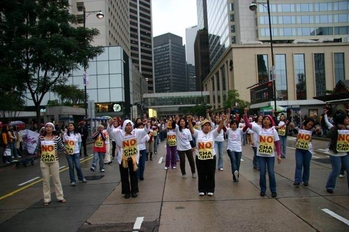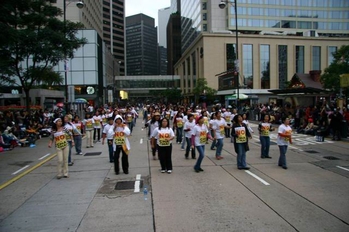There are many YouTube videos featuring dance performances of various groups and individuals. These videos were uploaded in order to promote products, to entertain, and sometimes to highlight political issues.
In the Philippines the YouTube video of the dancing prisoners in Cebu province became a worldwide hit two years ago. There are other videos of dancing Filipinos which were conceptualized as a component of protest campaigns.
Last month Juana Change videos became popular in the Philippines. These videos were used to express opposition to the administration-sponsored legislative bill that would amend the 1987 Philippine Constitution. Another video which entertained the public was the “100 women dance against charter change” in Hong Kong.
Check out the video first:
Were Hong Kong residents surprised to see that 100 dancing Filipinas in the streets last month? This special protest dance was reported by Inquirer, the Philippines’ top mainstream news website.
The video featured dancers wearing placards that read:
1. No to ChaCha (No to Charter Change) – referring to the proposal to amend the nation’s Charter.
2. Oust GMA (Oust Gloria Macapagal-Arroyo) – referring to the Philippine president.
The dance was held in Chater Road in downtown HK last December 28. The Chater Road is a famous meeting place of migrant domestic helpers every Sunday. Majority of domestic helpers in HK are Filipinas. Many of these domestic helpers are college graduates who left the Philippines to seek employment.
The protest dance was organized by members of Gabriela, an activist women’s group. The group issued this statement:
“Dancing against charter change is the way Filipino migrants in Hong Kong shall express opposition to the evident desperation of (Philippine President) Gloria Macapagal-Arroyo to stay in power by changing the Constitution.
“Filipino migrants have every right to oppose charter change for it shall only further intensify the inhuman labor export program of the Philippine government.
“With its sellout of the country’s patrimony and resources to foreign capital, there can be no doubt that it will bring more massive displacement of people from their lands, jobs and livelihood. The already more than 10 million Filipinos who have been forced to migrate shall surely increase faster as the people seek ways for their families to survive.”
The group is opposing the proposal of the government to intensify the liberalization and privatization of many sectors of the domestic economy.
Sailing Swanee lauds the dancing workers:
“I'm also against the charter changes, so I'm with you girls. I'm an Australian living in Hong Kong and have many friends in the Philippines and love the country and the people, But Gloria Arroyo doesn't deserve an extended term, in fact she should step aside now as she has been a disaster for the country.”
Kape't Yosi was one of the organizers of the dance:
“It was political and, at the same time, so fun to do. It did rain but it did not dampen the anti-chacha spirit of the dancers.”
as is explains why Chater Road is special to the Filipino community in Hong Kong:
Some people, definitely not friends of mine, find Filipino domestics sitting on the cold concrete of Chater Road an eye sore.
They think that them domestics are a weird contrast to Prada, Mandarin Hotel and the posh grandiosity of Central.
I think otherwise.
While Chater Road was not really closed for the sake of domestic helpers (that will be too considerate of Hong Kong), it has become a completely different community of people I can easily relate to, enjoy the heat of the sun while eating home-cooked meals with, brave the cold winds of yesterday’s climate while gulping hot coffee, think about our future while discussing our present.
It has become my new Manila as Victoria Park is Bandung for an Indonesian friend.
During weekdays, Chater Road teems with suits and ties, red cabs and cars.
On Sundays, and sometimes holidays, it simply teems with life.
Maybe the migrant workers who meet every Sunday on Chater Road in downtown Hong Kong felt powerless that they couldn’t directly express their anger at Filipino politicians. And so they danced in the streets hoping that their protest will be reported in the Philippines. They succeeded. The protest dance has proven that migrant workers can show concern for the homeland through special and symbolic actions. The internet can facilitate the sending of the message to the world.



Pictures courtesy of Arkibong Bayan







2 comments
What a creative and entertaining way to protest in a peaceful way. I am glad to see they received the attention they did. This is yet another testimate to the power of the internet!